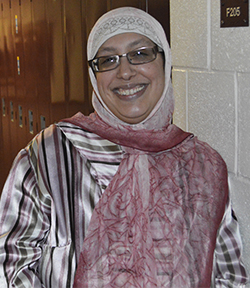CEDAR SPRINGS, Michigan – Teaching US and world history for years, Sairah Ahmed has been working to spread better understanding of her faith among students, incorporating religion studies into her world history courses.
“It’s so precious,” Ahmed said at the end of a recent school day, School News Network reported on March 1.
“Learning and studying religion is such a beautiful thing.”
For 13 years, Ahmed has been teaching her history classes at Cedar Springs High School.
The recent attacks by terrorists who falsely connect their actions to Islam have given her a heavy heart, feeling no connection between them and her faith.
“I would have been emotionally healthier to process that event with my students if (the perpetrators) were not Muslim,” she said, recalling the first Monday after the 2013 Boston Marathon bombings.
Wearing her hijab, Ahmed steps into the classroom to teach, and acknowledge her hurt.
“I usually bring that personal point to them: ‘This is really hard for me. This is not a good day for normal-thinking Muslims,’” said Ahmed.
Then she will help students process the terrible events of the day in light of extremists throughout history who have used religion to cloak their personal agendas.
Ahmed doesn’t address religion only after terrorist incidents, weaving it into her history courses as a way of helping students know their world.
“I want them to experience that every group has their take on this life, and questions about an afterlife,” she said.
“What better way to understand the human condition and the human experience than faith? How do we understand the world if we don’t understand these bigger, broader questions?”
History Talks
Teaching her history courses within current context, Ahmed parallels between today’s religious violence to events such as the Holocaust and the Hundred Years War, and the attraction of groups such as ISIL to the rise of Nazism.
“We have a lot of fear right now about terrorism,” said Ahmed, the mother of two young children.
“I tell my students ISIS is against me too, an educated Muslim woman. If they were to attack a building, they would go for me first. It’s not logical to be scared of all Muslims when we’re fighting a common enemy,” she added, using another acronym for the so-called Islamic State (ISIL).
Explaining to them why she wears hijab for modesty, she feels that experiencing this interfaith relations at young age is better for students.
“I think they’re the better for it, if they can be exposed to somebody from a different culture (who teaches) the same way anybody else would,” she said.
By doing so, Ahmed tries to counteract cultural hatred against and among religions with more realistic views of what they actually stand for.
“I hope to plant a seed of understanding, a seed of respect, for different cultures and values,” she said.
“There isn’t any religion that preaches hate. God is love, and that’s preached in every religion.”